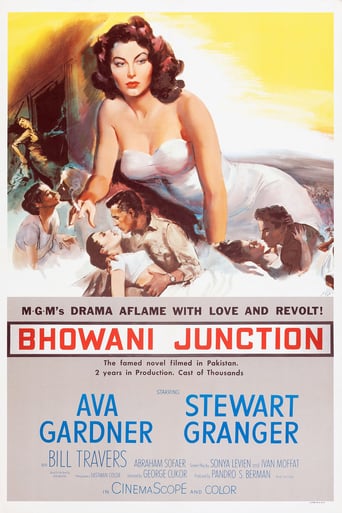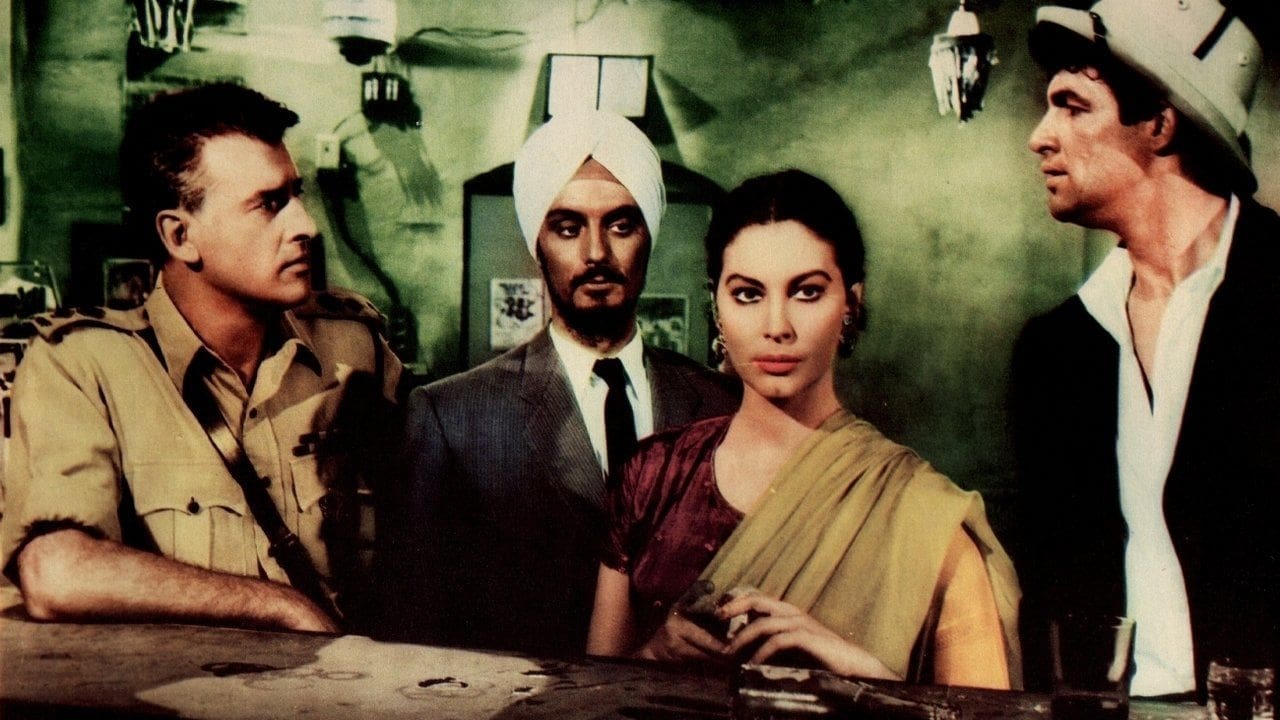iharvey
Well, I've always sort of identified myself as an AngloBanglo.My dad was born in Lahore in 1929 and my grandparents left Karachi in 1965 almost 20 years after partition because the Muslims had made it impossible for my Nana to continue to run her private school.The returned to England like so many AngloBanglos where they were too Indian for the white and not Indian enough for the Indians.Just like they were back in what was then Pakistan and by some account, India itself.You have to remember that at this point, as depicted in the film, 1947 was the cusp of partition and violence was everywhere. My grandfather told me graphic stories of entire trains of people slaughtered he had witnessed.Ava Gardner's character has to choose which side she is on but for many AngloBanglos the struggle goes on. We are neither brown enough for the browns, nor white enough for the whites. I now live in Canada but I self identify as English.The sub text in George Cukor's story has lost some of it's impact over time because few remember the upheaval of partition but for some of us, it bring it back into focus.More interesting to me is that it was released the year I was born, in England, in 1956.
James Hitchcock
Hollywood normally left films about British rule in India to the British themselves ("The Drum", "Black Narcissus", North West Frontier"), but "Bhowani Junction" is an exception. Certainly, John Masters' novel offered everything needed to make a thinking man's epic- an exotic setting, plenty of action, a thrilling finale and a serious theme, in this case racism. When Hollywood examined racial issues it often preferred to do so in the context of European colonialism rather than in the context of America itself. The film is set in the Indian railway town of Bhowani Junction in 1946, a year before independence. The British administrators are resigned to leaving India, but still hope to exercise an influence over the path the country will take after independence. Hence their preference for the Congress Party over the pro-Moscow Communist Party. After all Jawaharlal Nehru, the Congress leader, was a wealthy, patrician Fabian socialist, a lawyer by training, and educated at public school and Oxbridge (Harrow and Trinity College, Cambridge)- just like the British Prime Minister Clement Attlee (Haileybury and University College, Oxford). According to this film the Communists are attempting to frustrate the handover of power to the Congress Party by acts of sabotage, hoping to create chaos which will enable them to seize power themselves. Moreover, some Congress activists are also trying to hasten the departure of the British by non-violent acts of resistance, although these often play into the hands of the Communists. Unusually for a film about the Raj, the film does not concentrate solely on relations between the British colonialists and the native peoples of India. Several of the leading characters are drawn from a third group, the country's Anglo-Indian, or mixed race, community. The Anglo-Indians were, and are, a distinct community within India, bound together by the English language, an Anglocentric culture and the Christian religion. The main character is Victoria Jones, the daughter of an Anglo-Indian train driver, and the film depicts the relationships between Victoria and the three men in her life, Colonel Rodney Savage, a senior British army officer, Ranjit Singh, a Sikh active in the Indian independence movement, and Patrick Taylor, an Anglo-Indian railway official. (Many Anglo-Indians worked on the railways). The fact that Victoria's lovers are drawn from the three different communities is symbolic of her uncertainty about her own cultural identity. The Anglo-Indians tended to identify culturally with Britain rather than India, although few of them had ever visited Britain, but were not fully accepted by either the British or the native Indians, both of whom referred to them by the same derogatory term, "chee-chee". It is noticeable that Victoria's attempts to fit in with British culture are not always successful. She refers to her parents by the Latin terms "pater" and "mater", unaware that in Britain this is an upper-class affectation; no British engine driver's daughter would speak in this manner. Patrick is also torn between different identities. He dislikes the British, largely because they will not accept him as one of them, but also despises full-blooded Indians, whom he refers to as "wogs" (another derogatory term). Savage is far more liberal and tolerant about matters of race. The crisis of the story comes when Victoria kills a British soldier while he is attempting to rape her. Although the killing was clearly in self-defence, she fears that the British authorities will not, on account of her mixed-race origins, believe her version of events, so she tries to conceal the incident, thus allowing herself to be blackmailed by the Communists into assisting with one of their schemes. I said that Masters' novel offered everything needed to make an epic, and overall the film is a pretty good one, combining an exciting adventure story with an intelligent look at some serious issues. Perhaps, however, I should have said say that it offered everything needed to make an epic bar one thing- a major role for a big-name American star. Hence the eccentric casting of Ava Gardner as Victoria, who never seems convincing as an Anglo-Indian and whose accent wavers between British, Indian and American. There were, in fact, two big-name Anglo-Indian cinema actresses around this period, Merle Oberon and Vivien Leigh, but both would probably have been too old for the role, and both normally passed as white. (Oberon, in particular, denied having any connection with India and claimed falsely to be Australian). Stewart Granger is very good as Savage, a man who can be cynical and sardonic but also liberal and humane. I was disappointed, however, that most of the Indian characters were played, with some very dodgy accents, by white actors. Perhaps the casting of Gardner seems less eccentric when one considers that the film-makers changed the ending of the novel, in which Victoria ends up marrying Patrick. An ending in which a dashing white officer loses out to a mixed-race railway bureaucrat would not be in keeping with normal cinema conventions, so it was changed; Patrick dies heroically and Victoria marries Savage. Racially mixed romances were, however, a controversial subject, for some reason felt to be more acceptable on screen if the mixed-race girl who loves the white boy was played by a white actress. The Eurasian heroine of "Love is a Many-Splendored Thing", for example, another American film set in a British colony, is played by Jennifer Jones. It is ironic that films which set out to expose racism in the British Empire should also have unconsciously revealed some of the racist attitudes which prevailed in the Hollywood Empire. 7/10
sol
(There are Spoilers) Entangled love story between a Chi-Chi Eurasian half-breed Victoria Jones, Ava Gardner, and British officer Col. Rodney Savage, Stewart Granger,that leads to an attempted assassination of the country's, India, spiritual leader Mohandas Gandhi and future prime minister Jawaharlal Nehru. Taking place during the violence and unrest of circa 1947 India the movie "Bhowani Junction" works very hard to distinguishes between Gandhi's peaceful passive resistance movement and the communist and nationalist brutal and violence inspired movements that caused a bloody civil war between the Hindu's and Moslem's in 1947-48. The violence lead to the assassination of Gandhi, by a Hindu no less, and is still going on with partitioned former Indian provinces Pakistan and Kashmir today.Victoria feeling that she doesn't fit into the new and soon to be formed Indian nation is torn between her both fathers British and mothers Indian roots. Together with her fiancée Pat Taylor, Bill Travis, also a half bread Chi-Chi. They fear that they'll be left out when the native Indians take over the government and that leaves them both in a bind in either staying or leaving the country.Victoria at first slowly gravities toward her Indian nationality when she's attacked by British army officer Graham McDaniel, Lionel Jeffres, who had been eying her since she arrived at the Junction as a British/Indian transportation officer. Trying to fight the wild and lecherous McDaniel off Victoria bashed his head in with an steel rod killing him. Being taken in by Ranjit Kasel, Francis Matthews, who works with her at the transpiration office and his mother Sadani, Freda Jones, the two together with mutual friend Ghanshyam,Peter Illing, cover up McDaniel's death by hiding his body in a town garbage dump. It later turns out that there was also an Indian sentry murdered at the scene of McDanial's killing and even worse Ghanshyam turned out to be non-other then the communist rabble-rouser and terrorist Davay! Victoria is now in danger of being implicated in not only a terrorist act but in giving aid and comfort to a wanted terrorist leader Davay.Davay trapped in Bhowani Junction uses Victoria, by blackmailing her, to get him out by rail which alerts her former lover Taylor who together with her now lover Col. Savage, and a platoon of British/Indian soldiers, corral the the train. A desperate Davay take off on foot into a nearby train tunnel. Having Davay trapped in the ensuing shootout Taylor gets hit and later dies from his wounds but Davay is blown away by Col.Savage who also disarms the sticks of dynamite that he left on the tracks to explode. It's then when the train targeted for detonation by the now late Davay passes by that Col. Savage realizes that he, Taylor and the soldiers under his command, prevented the murder of India's future leaders,Gandhi and Nehru, who were passengers on that very train.Even though Ava Gardner as the Chi-Chi Victoria Jones was as beautiful as she ever was her relation with the men in her life in the movie,Pat Taylor Ranjit Kasel and Col. Savage, didn't really touch off any sparks or firework. Vctoria in the end falls in love with Col. Savage, and him with her. And at the same time Victoria not wanting to leave India with him is not that convincing at all.What really make the film worth seeing is the historic flavor that in has to it in how the world changed back in 1947, August 15th to be exact. A nation of then 345 million people broke away from the shrinking British Empire and was later to become one of the most industrious and populated country's on earth. By far overshadowing the colonial power, Great Britain, that ruled and exploited it, with a silk glove and iron fist, for some 250 years.
whpratt1
Greatly enjoyed this film about the British withdrawing from India and the wonderful photography and the great scenery. However, Ava Gardner,(Victoria Jones),"City On Fire",'79 looked simply beautiful, considering she tried to keep up with Frank Sinatra on the fast track of real life. Victoria Jones played the role of a very tricky gal, who twisted men around her little finger and pretended to be someone else other than herself. Stewart Granger, (Col. Rodney Savage),"The Wild Geese",'78, was a very clever military soldier and kept a close eye on Victoria for more reasons than only one. There is great acting between Gardner and Stewart who were at the height of their careers. Enjoy.



 AD
AD



